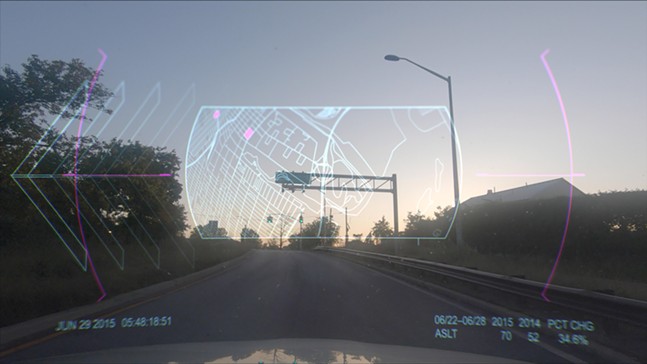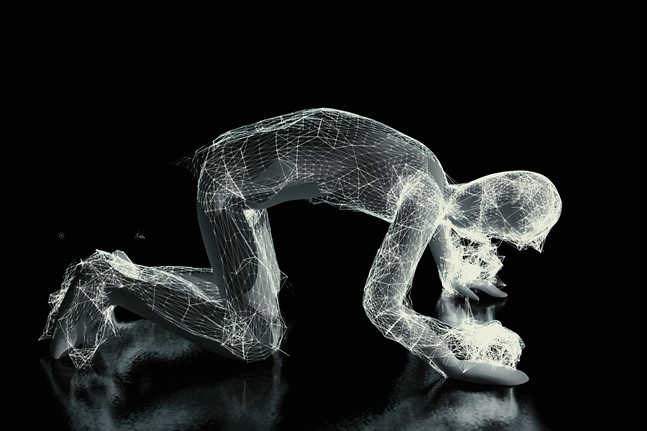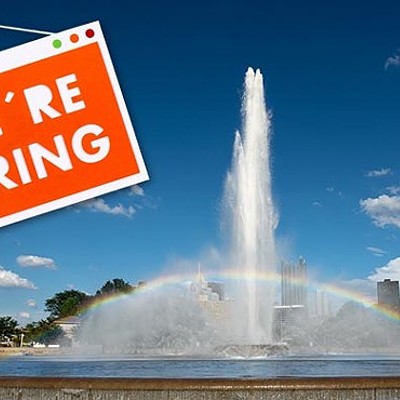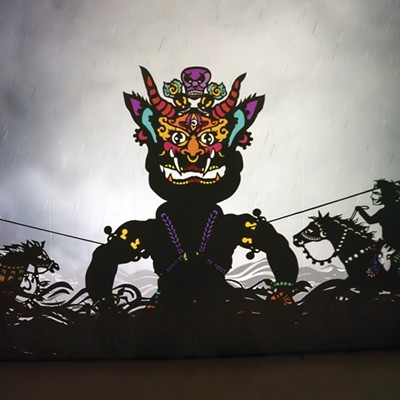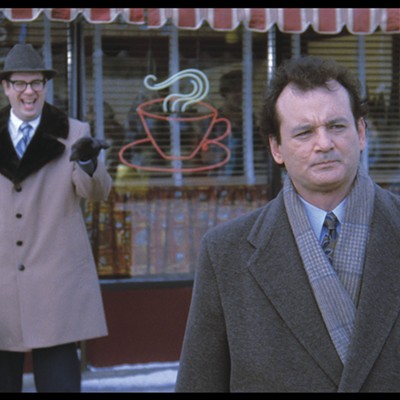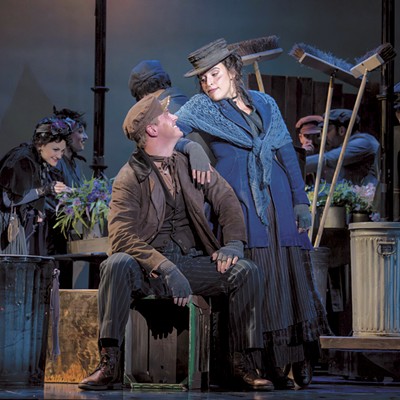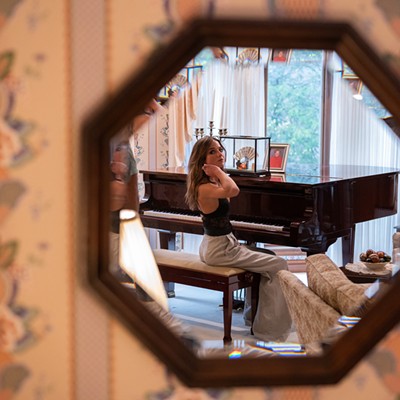Carnegie Museum of Art launches first-ever podcast series Mirror with a Memory
Right now might seem like the perfect time for Carnegie Museum of Art to explore podcast territory, but its first show, Mirror with a Memory, is more than just a fun distraction during the pandemic.
“I think we're all listening to more podcasts and taking in more media these days,” says Dan Leers, CMOA's curator of photography and organizer for the Hillman Photography Initiative, of which the podcast is part. “This one feels particularly timely.”
The six-part podcast, which debuted on Feb. 1 and is named after a larger cycle of programming, continues the initiative's mission of presenting what Leers calls “experimental and engaging programming around photography and contemporary issues.”
“It does so with perspectives and expertise, with different people from all kinds of backgrounds, and I think that's the most exciting element of this,” says Leers.
In each episode, host Martine Syms — described in CMOA's bio as a renowned Los Angeles-based artist who uses video and performance to examine representations of Blackness — speaks with various guests about "the intersection of photography, surveillance, and artificial intelligence."
It also coincides with the closing of the Trevor Paglen: Opposing Geometries exhibit in mid-March. Like the podcast, the show examines the ever-evolving ways technology manipulates and potentially weaponizes images, in this case with a variety of landscape photography and portraits. However, just because the tech used in Opposing Geometries is becoming more prevalent in our everyday lives, it doesn't mean we fully understand it, which is where programming like Mirror with a Memory comes in.
“One of our other goals was to be very accessible,” says Leers. “These are individuals with deep expertise in the field, but they're able to, like many artists and creative people, frame questions and look at these issues in new and unique ways that make them intelligible to anyone.”
He adds that the show will deviate from a dry “talking head” format, instead opting for something that unfolds through a more narrative arc, complete with excerpts from audiovisual artworks, original scored music, and more.
The first episode tackles Biometrics, with guest artist Zach Blas and filmmaker and scholar Manthia Diawara discussing how technology has recorded the human body throughout history, including with facial recognition.
The second episode, set to release Mon., Feb. 8, will feature author and professor Simone Browne, artist Sondra Perry, and artist and academic Mimi Onuoha discussing ways that “many surveillance systems are unable to see people of color or mislabel people of color, sometimes with very tragic effects,” says Leers.
Future episodes, to be released through Mon., March 8, will cover other subjects, including the surprising results of using AI to create stories, the impact producing and using tech has on the environment, and the implications of using photos or film as evidence.
Leers explains that the podcast serves to help people both better understand the tech that they are becoming increasingly aware of without giving way to Luddite-esque panic.
“A photograph is here to stay as a form of documentation or evidence, we rely on it in a lot of ways that we just won't be able to move away from,” says Leer. “That said, increasingly people are becoming aware of just how much a picture or video can be manipulated. It's more about realizing that awareness, and encouraging people to educate themselves a little bit more about how these techs are being used, how they originated, and where that might be leading.”
In that regard, the series has a more optimistic bent, including the final episode featuring Forensic Architecture founder Eyal Weizman covering how people can use tech to hold government entities to account by harnessing "the power of pictures and flipping them.”
“We didn't want this to just be a Big Brother is watching you, throw your hands up because you can't do anything about it,” says Leers. “We want to promote optimism and hope in the face of some of these issues. Artists are uniquely positioned to do that.”
In addition to the podcast, CMOA also plans on publishing a Mirror With A Memory book with original artwork and other content that will allow readers to "engage even further with these ideas," says Leers.
He adds that developing a more in-depth understanding of tech from different angles will arm people with knowledge so that “we as a society can try to harness these things for good and point them in directions that are beneficial.”
Mirror with a Memory episodes are available on the CMOA website and on Amazon, Anchor, Apple, Google, and Spotify.
“I think we're all listening to more podcasts and taking in more media these days,” says Dan Leers, CMOA's curator of photography and organizer for the Hillman Photography Initiative, of which the podcast is part. “This one feels particularly timely.”
The six-part podcast, which debuted on Feb. 1 and is named after a larger cycle of programming, continues the initiative's mission of presenting what Leers calls “experimental and engaging programming around photography and contemporary issues.”
“It does so with perspectives and expertise, with different people from all kinds of backgrounds, and I think that's the most exciting element of this,” says Leers.
In each episode, host Martine Syms — described in CMOA's bio as a renowned Los Angeles-based artist who uses video and performance to examine representations of Blackness — speaks with various guests about "the intersection of photography, surveillance, and artificial intelligence."
It also coincides with the closing of the Trevor Paglen: Opposing Geometries exhibit in mid-March. Like the podcast, the show examines the ever-evolving ways technology manipulates and potentially weaponizes images, in this case with a variety of landscape photography and portraits. However, just because the tech used in Opposing Geometries is becoming more prevalent in our everyday lives, it doesn't mean we fully understand it, which is where programming like Mirror with a Memory comes in.
“One of our other goals was to be very accessible,” says Leers. “These are individuals with deep expertise in the field, but they're able to, like many artists and creative people, frame questions and look at these issues in new and unique ways that make them intelligible to anyone.”
He adds that the show will deviate from a dry “talking head” format, instead opting for something that unfolds through a more narrative arc, complete with excerpts from audiovisual artworks, original scored music, and more.
The first episode tackles Biometrics, with guest artist Zach Blas and filmmaker and scholar Manthia Diawara discussing how technology has recorded the human body throughout history, including with facial recognition.
The second episode, set to release Mon., Feb. 8, will feature author and professor Simone Browne, artist Sondra Perry, and artist and academic Mimi Onuoha discussing ways that “many surveillance systems are unable to see people of color or mislabel people of color, sometimes with very tragic effects,” says Leers.
Future episodes, to be released through Mon., March 8, will cover other subjects, including the surprising results of using AI to create stories, the impact producing and using tech has on the environment, and the implications of using photos or film as evidence.
Leers explains that the podcast serves to help people both better understand the tech that they are becoming increasingly aware of without giving way to Luddite-esque panic.
“A photograph is here to stay as a form of documentation or evidence, we rely on it in a lot of ways that we just won't be able to move away from,” says Leer. “That said, increasingly people are becoming aware of just how much a picture or video can be manipulated. It's more about realizing that awareness, and encouraging people to educate themselves a little bit more about how these techs are being used, how they originated, and where that might be leading.”
In that regard, the series has a more optimistic bent, including the final episode featuring Forensic Architecture founder Eyal Weizman covering how people can use tech to hold government entities to account by harnessing "the power of pictures and flipping them.”
“We didn't want this to just be a Big Brother is watching you, throw your hands up because you can't do anything about it,” says Leers. “We want to promote optimism and hope in the face of some of these issues. Artists are uniquely positioned to do that.”
In addition to the podcast, CMOA also plans on publishing a Mirror With A Memory book with original artwork and other content that will allow readers to "engage even further with these ideas," says Leers.
He adds that developing a more in-depth understanding of tech from different angles will arm people with knowledge so that “we as a society can try to harness these things for good and point them in directions that are beneficial.”
Mirror with a Memory episodes are available on the CMOA website and on Amazon, Anchor, Apple, Google, and Spotify.

